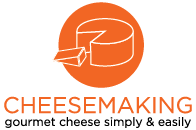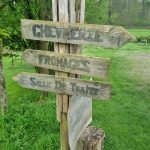When did you take up cheesemaking and why?
One night as I tasted a piece of purchased haloumi I wondered to myself; “how hard could it be to make this cheese myself”.
In my youth whilst renting a cabin on a farm I in North East Victoria I decided to make myself some cheese. I had access to fresh cow’s milk and not knowing anything about making cheese I took the electric fry pan, added the milk and some junket and made curds. I drained them added salt and hung it for a month or so in cheesecloth and found I had a very nice hard cheese.
Remembering this I thought I could try another batch of cheese, perhaps with a bit more finesse than last time, ideally I really wanted to make some fetta and haloumi.
What was the first batch of cheese you made by yourself? How did you feel about the experience and how did the cheese turn out? Can you compare your experience between then and now?
I started with a Fetta cheese. The Fetta was great, but I did not know to store it in salted whey brine so my first batch ended up slimy after a few days and then started to melt into the brine. I since learned to use a whey salt mixture which works great.
After doing fetta I tried a haloumi and it worked fabulously.
And then I decided to jump into the DEEP end and try camembert, with a terrible outcome…… Well as a friend said to me, “the French have spent 100’s of years perfecting the Camembert and you have jumped into it without the experience of making cheese” …. she was absolutely right. I have now managed to make Camembert and Brie that my friends fight over.
Every time I make a new cheese it is an experiment, I never know if I am going to get a cheese like as should be, I just follow the recipe and see how it turns out. Then I learn from my experience. .
Sometimes I take one of my cheeses from a batch and experiment with a different process for them, such as washed rind, ash rind, or different additives such as herbs etc. in the mix.
But experimentation on cheese should come after you have perfected the basic recipe. (Please don’t ask me about my mushroom infused camembert…. erk!)
What sort of cheeses (& dairy products) do you make, how many times have you made cheese, why do you like making cheese and how often do you make it?
I make Triple Cream Brie, Persian fetta and Greek fetta most often, and have been experimenting with a few different pressed cheeses. I love making Port Salut, “smelly sox cheese” as my Mum used to call it. It was my Mum’s favourite cheese and I thought I would give it a go, a soft pressed washed rind cheese originating with the Trappist Monks, smells awful when you open the container, but has a taste to die for. My friends love it, after the smell dissipates. The modern version of it they just spray the rind to make it look orange, the traditional washed rind whilst smelling does taste so much better.
One of my great successes has been a Labnah infused with vanilla bean and then drizzled with honey, I took it to work and watched the starving hoards descend upon it; they just could not get enough. I would recommend this as an easy cheese to make for a special occasion. Takes a bit of time to make but no real effort, I made my own yoghurt and then used that to make the labnah.
I started making cheese as a new hobby, but I have since gained a great passion for it and gained a large array of equipment too. I try to make cheese at least every second weekend, alternating between soft and pressed cheeses so that I don’t have too much short-lived cheese that I have to deal with and can’t use or feed to others.
After my trip to France, I have made some Moribier style cheese which has turned out fabulously. The Comte cheese I saw there will take a bit of extra planning.
What cheeses have I made so far:
Edam
Edam Boule
Gouda
Smoke Gouda
Baby Swiss
Port Salut
Haloumi
Havarti
Greek Fetta
Persian Fetta
Camembert
Triple Cream Brie
Labneh
Ricotta
Mozzarella
Chevre – Ashed and plain
Morbier Cranberry Wensleydale
Sage Wensleydale
Jarlesberg
Port Salut
Drunken Goat
Wine infused Cheddar
Pont l’eveche
Triple Cream
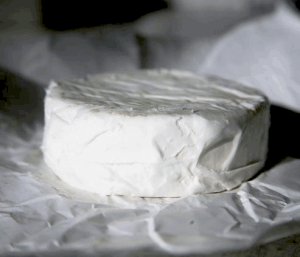
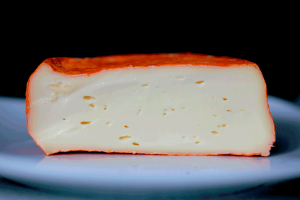
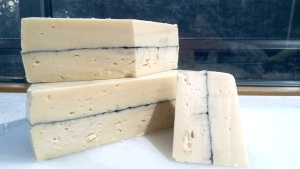
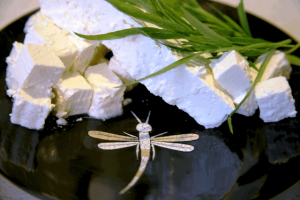
What has been some interesting or rewarding cheesemaking experience/s
Obviously, my friends’ comments are rewarding, and that some of my friends have asked how to make the cheese and have started becoming cheese makers themselves.
It is rewarding when a cheese works as per the recipe, i.e. the white mould covers the surface without gaps, the swiss expands as it should, and when you cut that cheese for the first time and it is just as you want it and tastes divine.
My greatest reward lately has been my successful Morbier, it’s just like I wanted it to be. And the rave reviews from the tasters.
And for people from France saying that they love my cheese and just can’t buy what I make in Australia. They definitely want more.
What has been your biggest cheesemaking challenge/s
Mould, always mould, the good the bad and the ugly. I am always scrupulously clean in my processes whilst making cheese, but sometime something happens that seen to be out of control.
Starting a new type of cheese is always a challenge and you don’t know what you will get during or after the process. What works for one cheese may not work for another type and even the same cheese in a different part of the year may turn out totally differently.
Washed rind cheeses are my latest interest and I have great success in many like the Port De’Salut but others have been more problematical. Getting the lovely Washed Rind surface and the soft interior can be a challenge. Pont L’Eveche is my latest challenge which I will definitely succeed with even if it takes my months.
What is your favourite cheese(s) to make?
My favourite cheeses have always been Brie and washed rind cheeses. My latest cheese in the favourites stake is the Morbier style cheese which I make after returning home from France.
What is your advice to anyone looking to starting out on a cheesemaking journey?
Start small and work up while learning all the trips and hazards of cheese making. I took far too many leaps and had great failures that I could have avoided with more knowledge.
Do a course earlier on so that you get the basic knowledge without the trial and error failures.
Cleanliness, sterilise everything, you don’t want those bad microbes joining you on the cheese journey.
Do research on the internet, but remember that all information is not going to be correct. But there are great recipes that you can use for future projects.
Take notes on each batch of cheese, you might think you will remember what you have done, but you won’t. Take full notes on what you are producing and what you have used and how you did it. If you are making a cheese that takes 3+ months to mature or more you just might not remember everything you actually did.
Most importantly, there is no such thing as a bad cheese, it may not be exactly to the recipe, but it could be a great cheese.
| Cranberry Wensleydale | |||
|---|---|---|---|
| Ageing | Apply wax or vacuum pack and allow the cheese to age at 12C for 3 weeks to 3 months | ||
| Rest | Remove from the press and cheesecloth and allow to dry for 2 days | ||
| Press | Turn and press at 25kg for 12 hours turning at 6 hours | ||
| Press | Press at 5kg for 15 mins. | ||
| Add | After two hours break up the curd for one final time and apply 3 tsp salt and 1 cup of dried cranberries (Craisins) | ||
| Drain | Allow curd to settle to bottom of pot then remove the whey. Ladle the curds into a colander lined with cheesecloth, tie in a bule and for 2 hours open every 15 mins to break the curd into small pieces | ||
| Maintain | Maintain this temperature, and stir the curd as often as necessary to stop the curd knitting together for 2 hours | 32 | |
| Stir | Stir the curds again as you raise the temperature to 32C | 32 | |
| Rest | Allow the curd to rest for 15 mins | ||
| Stir | Stir the curd gently for about 15 mins | 30 | |
| Cut | Into 13mm cubes and let stand for 5minutes | “ | |
| Rennet | 3ml 200 imcu strength rennet to set milk in 45 minutes. | 30 | |
| Culture | Add culture and allow bacteria to work in the milk for 45 mins | 30 | |
| CaCl | 3ml up to .5 ml per litres (optional) | ||
| Starter | 1 Tad R7/M265 | “ | |
| Milk | 9 Litres milk @ 30ºC | M = 30 | |
| Step | Comments | Guide Temp* | Actual Temp |
